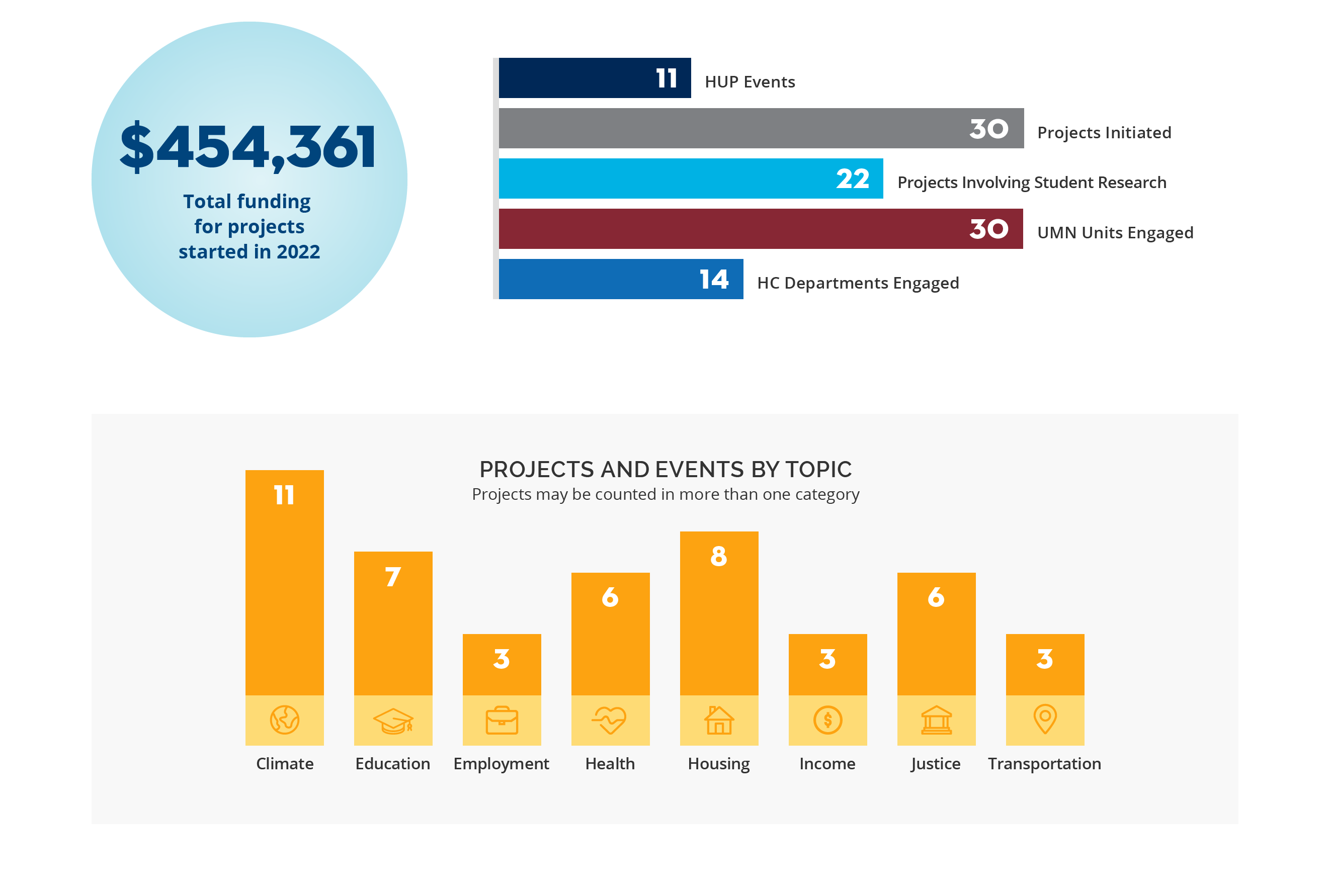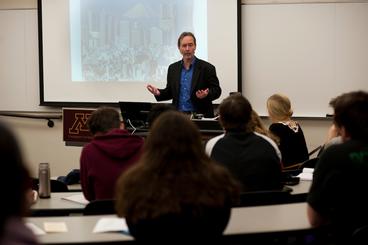Message from the Director
Message from the Director
2022 was an exciting year of transition. We hired our first permanent staff member, who has provided tremendous support for our two student programs—the HUP Collaborative Research Assistantship (HCRA) and the HUP Evaluation Assistantship (HEA). Our newest program, the HEA, funds two year-long graduate assistants who will develop evaluation tools to help the county build long-term evaluation capacity.
In August, HUP convened the first in-person leadership retreat since before the pandemic. County and University leaders and subject matter experts gathered to identify HUP’s first ever strategic focus areas—housing, climate action, and guaranteed basic income (GBI). These focus areas will help HUP target resources for more impactful results. A $50,000 HUP Mixer grant to fund GBI research, a study on barriers to homeownership, and a collaboration with the University to help define and measure climate resilience are a few of the many projects that already support these three areas.
Internally, HUP is developing a robust project management workflow called the “Project Experience.” Our goal is to ensure every project begins with intentional alignment to strategy, includes support for partners at critical junctures throughout the project, and produces results that are effectively translated into policy and academic outcomes.
We are happy to present our 2022 annual report, which celebrates the great work between these two institutions done in the name of improving the lives of county residents.
In partnership,
Scott Vargo, HUP Director
Connect with HUP
January - Planetary Health as a point of entry to climate change action
Professor Teddie Potter of the School of Nursing presented on “Planetary Health: An Invitation to the Great Transition” and the importance of taking proactive initiative with approaches to climate change.
February - Lessons from Past Government Policies Can Inform Future Policies -
Priority Area: Justice
PhD Candidates Rashad Williams and Rebecca Walker shared their research on addressing disparities through government policy as they relate to racial equity in planning and urban environmental landscapes. Both speakers emphasized the importance of historical context in creating equitable government policies.
July - LGBTQ Older Adults Need Informed Healthcare and Services
Priority Area: Health
Rajean Moone of the School of Social Work shared findings from the “Minnesota 2022 LGBTQ Aging Needs Assessment Report.” Recommendations included the importance of trauma-informed care among aging providers and programs and services targeted to reduce isolation as LGBTQ older adults are more likely to live alone than other older adults.
August - Equitable Education policies require intersectional framing
Priority Area: Education
Professor Nicola Alexander of the College of Education and Human Development presented on education funding philosophies and implications for equity and disparities in the education system. Alexander’s presentation highlighted the prevalence of myths and synonymization along with the importance of intersectionality.
October - Collaboration is an innovative seed for equitable approaches to climate change
Priority Area: Climate
Professor Elise Harrington of the Humphrey School of Public Affairs detailed a collaborative research effort looking at navigator programs and pathways to energy assistance and weatherization. The efforts launched from the Minnesota’s Clean Energy Future Series: Energy and Equity in the Twin Cities Workshop.
November - Community-based research identifies factors of housing instability
Priority Area: Housing
Stuart Grande of the School of Public Health shared research on barriers to housing and housing instability with an approach focused on a local context and multi-method examination of barriers. The research identified the tensions between interpersonal connections, perceived capacity for change, and personal stability as they relate to housing status.
December - Cultural and relational connection serve as preventative health measures
Priority Area: Health
Professor Jordan Lewis of the Department of Family Medicine & Biobehavioral Health at the University of Minnesota Medical School Duluth Campus presented on aging in Alaska Native communities and cultural generativity, defined as any act of an Elder where they pass down traditional values, subsistence practices, language, beliefs, and any other activity that preserves and passes on the culture of the family and community.
Would you like to propose a webinar idea? Submit your suggestion!
HUP Panel: Addressing Climate Change and Disparities through Transportation
Priority Area: Climate, Transportation
HUP hosted a panel that brought together University researchers and County directors to discuss the relationship between transportation investment and addressing climate change. 130 county staff attended. Panelists included Professor Yingling Fan (Humphrey School of Public Affairs), Dr. Kyle Shelton (Director, Center for Transportation Studies), Diana Chaman Salas (Director, Hennepin County Climate and Resiliency), and Chris Sagsveen (Director, Hennepin County Transportation Operations). The importance of community engagement was a recurring theme as were balancing short-term and long-term plans, working across governances, and shifting perspectives for users.
The pilot demonstrated that the HCRA is a unique opportunity for students to gain real-world experience conducting innovative and actionable research for Hennepin County. County staff appreciated this no-cost way to gain an external, cross-disciplinary perspective and build capacity to continue addressing priority issues. Students reported gaining leadership and research skills and valuing the first-hand experience with public service and local government. Two students were hired as county interns to build on their work.
Youth and AIDS Projects Engaging African American Same Gender Loving Men
Priority Area: Health
Over the course of two months, Brenda Senyana (Hennepin County) and Professor Calla Brown (Medical School) hosted six different events focused on engaging and providing outreach to African American men who are same gender loving. Through these events the research team also focused on understanding factors contributing to high HIV prevalence and providing resources on how to mitigate chances of infection and provide treatment and support services to African American men.
Multisector Examination of Barriers to Home Ownership
Priority Area: Housing
Researchers at the University of Minnesota, Center for Urban and Regional Affairs (CURA), along with the Center for Innovation and Excellence (CIE), and the Housing and Economic Development Department at Hennepin County (HED), investigated different obstacles that BIPOC populations in Hennepin County face concerning home ownership. In order to best understand these challenges and obtain information that accurately reflects the experiences of the target population, focus groups were conducted with individuals that were interested in buying a house. This research illuminated the disparities in home ownership by also providing context into the varied impact of these disparities on different populations.
Identifying Ways to Mitigate Impact Of Displacement As A Result Of The Blue Line Extension
Priority Area: Transportation, Housing
The Center for Urban and Regional Affairs, in collaboration with Hennepin County and county residents, is identifying ways to sustainably and equitably prevent displacement among North Minneapolis, Robbinsdale, Crystal, and Brooklyn Park residents, as a result of the Blue Line Extension. Given that displacement is harmful and disproportionately impacts communities of color and contributes to socioeconomic disparities, this research will utilize a Racial Equity Framework that will be inclusive of systemic issues.
Researchers Evaluate Hennepin County’s Maternal Health Initiative
Priority Area: Health
The Center for Antiracism Research for Health Equity, founded by Dr. Rachel Hardeman, at the University of Minnesota, School of Public Health, is conducting an evaluation of Hennepin County’s Public Health Maternal Health Initiative through a health equity examination and culturally responsive techniques in order to best assess effectiveness. The research team will also employ different metrics in order to assess performance and outcomes—such as a midway progress report and a final evaluation report.
Cross-collaborative Approaches To Reduce Carbon Emissions And Improve Transit Services
Priority Areas: Transportation, Climate
In an effort to understand the effectiveness of dedicated right-of-way (ROW), Jason Cao (Humphrey School of Public Affairs) and Rob Luckow (Hennepin County) are examining how dedicated ROW can help reduce carbon emissions and the impact of these emissions on utilization of transit services. In order to best assess the benefits of dedicated ROW, the research team will conduct both a literature review and an empirical study to obtain a more comprehensive understanding of the pros of dedicated ROW and how it will impact those who use public transit systems.
Supporting Innovation in Emergency Response
Priority Area: Justice
Hennepin County partnered with HUP to support innovation in the county’s Public Safety Answering Point (i.e., 911). HUP helped scope the work, coordinated student hiring, and provided project management support alongside the county supervisors. One graduate student is coordinating a multijurisdictional effort to develop a comparative evaluation of residents’ experiences calling the county’s 911 system. Findings from this project will help county public safety officials ensure all residents experience equitable treatment when dialing 911. A second student explored cutting-edge technologies to improve call comprehension and coordination among regional 911 systems, while reducing the demands on dispatchers.
27 Grad Students Support Evaluation Work and More through Class Projects
Priority Areas: Climate, Justice, Housing, Income
Students took on six separate county projects supporting an array of exciting work:
- Principles and Methods of Evaluation (OLPD 5501) - evaluation plan for an internal workforce development program
- Qualitative Methods for Policy Analysts (PA 5041) - explored best practices to expand the tree canopy in diverse communities
- Program Evaluation (PA 5311) - evaluation plan for a behavioral intervention program and recommendations on developing evaluation practices in local government
- Humphrey Capstones (PA 8081) - three separate capstones evaluated the county’s homeless case management services, compared Guaranteed Basic Income models, and cataloged locally driven climate and resilience efforts
Have a student project idea? Submit it here.
Leveraging Technology for Climate Change Adaptation and Mitigation
Priority Area: Climate
Researchers at the U’s St. Anthony Falls Laboratory are exploring the use of submerged jets to reduce the unintentional transport of invasive species between Minnesota lakes. Invasive species can destroy biodiversity and lead to the extinction of native species. The effectiveness of this exciting technology is being modeled near actual boat ramps within Hennepin County. Meanwhile, GEMS Informatics and Hennepin County Environment & Energy staff are coordinating efforts to identify and develop technology solutions to support interjurisdictional conservation planning and action. Partners in this work include the Three Rivers Park District, regional watersheds, local cities, and the Minnesota Department of Natural Resources.
Closing the Digital Divide
Priority Area: Employment, Education
Hennepin County’s Office of Broadband and Digital Inclusion partnered with the University to help tackle multiple facets of the digital divide. A doctoral student evaluated the Affordable Connectivity Program (ACP), which helps lower-income households pay for internet. The student’s findings led to her developing culturally appropriate messaging and outreach toolkits designed to increase awareness of, and enrollment, in the ACP. Meanwhile, a collective of Humphrey School staff and students examined the county’s internal capacity to support the digital needs of residents. This work identified gaps in connecting residents to digital services and opportunities for the county to serve a greater number of county clients.












